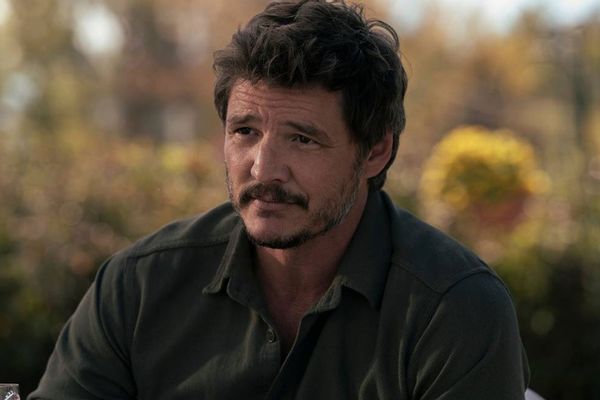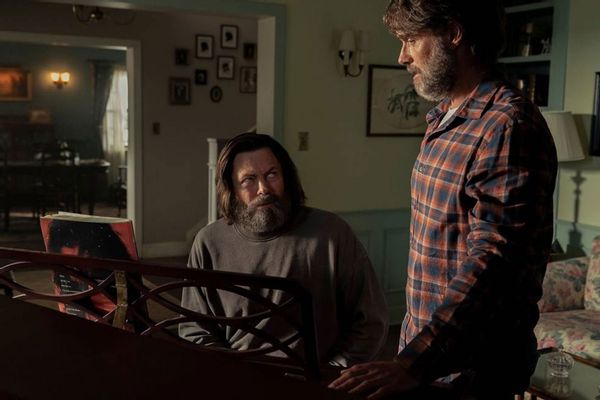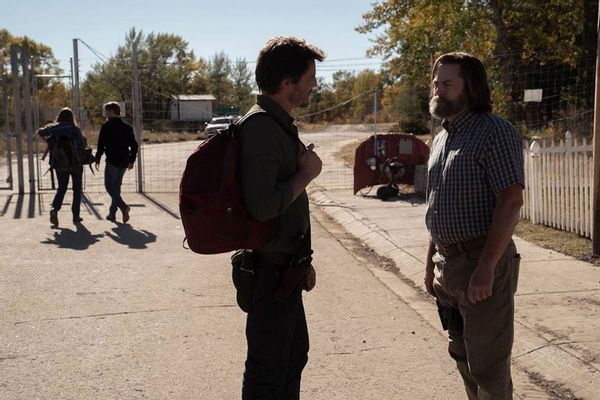In “The Last of Us,” Nick Offerman and Murray Bartlett battle loneliness at the end of the world
Multiple studies and numerous articles warn that the planet is in the throes of a loneliness pandemic. The British government created a Ministerial Lead for Loneliness position in 2018. Japan followed suit in 2021, making its Minister of Loneliness an official cabinet post.
As threat levels go, this may not seem on par with the Cordyceps outbreak that destroys the world in “The Last of Us,” because its symptoms aren’t discernible to observers or tangible.
Neither did it sweep the world overnight: Former U.S. Surgeon General Vivek Murthy referred to loneliness as a public health epidemic in 2017, warning that chronic loneliness places people at greater risk of depression, anxiety and developing heart disease and dementia. The culturewide isolation posed by the COVID-19 pandemic only exacerbated what was already in motion. We’ve been hurting for a long, long time.
If the third episode of “The Last of Us” made you break out into an ugly cry, that doesn’t necessarily make you one of the stricken. It simply proves co-creator Craig Mazin understands that apocalyptic fables are less about wildly speculating about the future than forcing us to confront who and where we are now.
 Pedro Pascal in “The Last of Us” (Liane Hentscher/HBO)
Pedro Pascal in “The Last of Us” (Liane Hentscher/HBO)
“The Last of Us,” which has been picked up for a second season, is HBO’s biggest hit since “House of the Dragon.” Some of its success is attributable to the phenomenal popularity of the video game from which it’s adapted, but plenty of people who have never touched a PlayStation have fallen for it too. Casting Pedro Pascal‘s as its hero, Joel Miller, likely lured some newcomers; unlike “The Mandalorian,” this drama doesn’t encase him in metal.
Of course, a charismatic face only carries a story so far. A stronger explanation of why this show is defying our collective doomsday fatigue points is its insistence on pushing back against despondence. Nearly every other survival horror sells savagery, depicting humanity as more brutal than the monsters their creators dream up to devour or conscript the weak.
“The Last of Us” doesn’t pretend people aren’t a threat. But it also insists we’re the cure.
Mazin and co-creator Neil Druckmann are making sure Joel takes his time to figure that out. As it stands, he’s determined to keep his cross-country companion Ellie Williams (Bella Ramsey) at arm’s length. Those defenses will fold, as they’re prone to do when the person laying siege is a child. But the best way to crack it is to serve an example of what can be gained by letting someone in.
Mazin wrote this mostly standalone episode, titled “Long Long Time,” as that instructive parable told in flashback and starring Joel’s allies Bill (Nick Offerman) and Frank (Murray Bartlett), brought together by the music of Linda Ronstadt.
In 2003, when the military arrives to evacuate Bill’s small Massachusetts town, he waits them out in his bunker before emerging, triumphantly, to plunge into his dream world, a street and a life without nosy neighbors.
Offerman wasn’t originally cast as Bill, but since most people still recognize him as his “Parks and Recreation” curmudgeon Ron Swanson, it’s hard to imagine anyone better suited for the part. Bill, a hardcore survivalist, is basically Ron Swanson minus the joie de vivre and a lot more guns. That heightens the comedy of watching him methodically plunder a gas station, the local Home Depot and the wine store before erecting fortifications, placing traps and harvesting goodies from his raised vegetable beds.
“The Last of Us” doesn’t pretend people aren’t a threat. But it also insists we’re the cure.
From there, his life consists of enjoying his carefully plated forest-to-table meals for one, paired with fine vintages, and occasionally watching closed-circuit broadcasts of zombies stumbling into his traps.
One of Bill’s perimeter pits becomes the site of his meet-cute with Frank, who is everything Bill does not appear to be: he’s gentle, refined and admittedly vulnerable. Once Bill springs Frank from that dirt hole, he tries to send him on his way. But Frank quickly cracks Bill’s shield; he’s so hungry, can Bill spare a bit of food before he goes? Bill relents, and three years later, they’re bickering over renovations.
“Long Long Time” takes its title from Ronstadt’s lonesome 1970 single, which Frank finds in a songbook he digs out of Bill’s piano bench, insisting on singing for his supper. But Frank knows precisely what he’s doing, using the song to disarm his reluctant host.
 Nick Offerman and Murray Bartlett in “The Last of Us” (Liane Hentscher/HBO)
Nick Offerman and Murray Bartlett in “The Last of Us” (Liane Hentscher/HBO)
In this age of overused needle drops, this song’s diegetic presence is as flawlessly applied as Frank’s seduction. He sits down at the piano and clumsily bangs out its opening melody, singing a verse or two with tinny force until Bill can’t stand it anymore. Urging his visitor to move aside, Bill takes his place and, with the feathered grace the composition calls for, conveys its poignant poetry as the songsmith intended.
This also exposes Bill’s survivalist front as a camouflage hiding a desolate cavern Frank leaps into. Bartlett’s onscreen glow is never lovelier than when Frank rewards Bill’s serenade – “Love will abide, take things in stride/ Sounds like good advice, but there’s no one at my side” – with a silent teardrop.
Bill and Frank originated in the video game, although players only get to know one of them; Frank is only mentioned in passing as Bill’s absent “partner.” It’s implied that they were in love, although never confirmed. The TV drama fills this story gap by writing a vibrant romance for them and placing it front and center, showcasing the breadth and diversity of Offerman’s dramatic palette. His range shouldn’t surprise anyone who watched him in “Devs.” The brightness Bartlett infuses Frank with isn’t uncharacteristic of his capabilities either; skewering that gleam with lances of bitterness won him an Emmy for his work in Season 1 of “The White Lotus.“
The actors’ complementary chemistry makes watching their intimacy develop over time into treasure. Bill could have subsisted by himself indefinitely, but at every turn, Frank makes him live fully. He shows Bill how to express love physically, but also aesthetically, turning Bill’s neighborhood wasteland into a private shabby chic utopia. “Paying attention to things, it’s how we show love,” Frank says moments before enraging Bill by announcing that the two of them are going to make friends.
“We don’t have friends, Frank. We will never have friends because there are no friends to be had,” Bill seethes.
Frank’s already been talking to Tess (Anna Torv) over their radio, so Bill’s anger is pointless. Soon she and Joel are visiting Bill and Frank and establishing a trade partnership. Tess and Frank are friendly; Bill and Joel are not, because they are the same. (He eventually admits to Joel that he never liked him, “but still, it’s like we’re friends. And I respect you.”) Their alliance strengthens both parties.
 Pedro Pascal and Nick Offerman in “The Last of Us” (Liane Hentscher/HBO)
Pedro Pascal and Nick Offerman in “The Last of Us” (Liane Hentscher/HBO)
In the end, it isn’t raiders or infected that do in Bill and Frank but an enemy they can’t defeat. Yet their last stand in the face of it doesn’t hold one splinter of sadness. Summing up their time, Bill simply tells Frank “You were my purpose.”
Since “The Last of Us” pegs civilization’s collapse to 2003, that means YouTube, Facebook and Twitter never came to exist in this world, and neither did their means of simulating friendship or algorithmic influence over what we watch or how we think. Even the video games that Ellie marvels at are designed to be played by two people standing next to each other. Forging bonds, platonic and otherwise, is a face-to-face endeavor, as it once was for us. As Bill and Frank’s ballad shows us, connection is a risk. But it can be more advantageous than siloing ourselves off from others.
Want a daily wrap-up of all the news and commentary Salon has to offer? Subscribe to our morning newsletter, Crash Course.
Druckmann, whether he meant to or not, endorses that notion by making the Cordyceps’ interconnectedness central to their dread. It isn’t simply the threat of death by a brain infection that’s frightening, but the Cordyceps’ ability to communicate through a web similar to the mycorrhizal network in forest soil. The Cordyceps is stronger than us because it works as a unified force or a hive mind. We, its prey, are simpler to divide and overpower.
Misanthropy is easy, though. That’s why it’s a typical feature of the broken hero profile. People striding across treacherous movie and TV landscapes, unwilling to risk the weakness that anything other than self-reliance might expose, seem so fierce. When we’re feeling confident those characters have an outsize appeal, but dark moods can transform such figures into arguments for withdrawal, giving loneliness the illusion of strength. Other people are unreliable; other people will only slow us down; other people are Hell, and isn’t there enough of that to go around?
Bill’s choice to take a chance on Frank contradicts that bitterness. The audience witnesses their full relationship; Joel is only privy to parts of it. But that stanza is enough to break something open in him. There is always someone worth saving and protecting, Bill tells Joel in his farewell message. “That’s why men like you and me are here,” he writes. “We have a job to do.”
The words are terse, capturing how Bill wanted Joel to see him, always a lone soldier ready to singlehandedly take on the apocalypse. Many scenes before that, “Long Long Time” reveals the truth of Bill’s strength as he sits beside a strawberry plot Frank planted to surprise him.
Holding Frank’s hand, he admits, “I was never afraid before you showed up.”
Read more
about this topic

